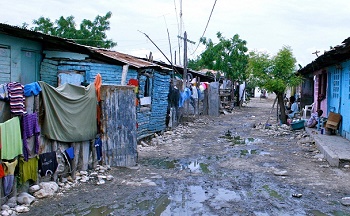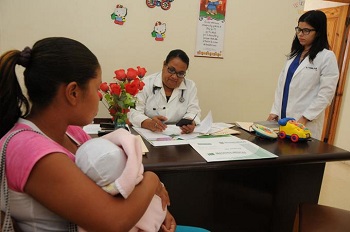Also available in: Español
Source: Corresponsales Clave
The situation of the Haitian migrants in Dominican Republic deserves the attention of the region. Through this report, Corresponsales Clave wants to show part of the reality of Dominican-Haitian women, adolescents and girls.
By: Miranda Suero Corresponsales Clave
In the last months several reports have been released on the areas of Haitian immigrants in Dominican Republic, which show that there is an alarming prevalence of HIV infection and they point out that this is due to sexual work and sexual exploitation that abounds in such communities. Girls are sexually exploited since they are 11 years old, without any type of healthcare; many of them are pregnant and have HIV, according to a newspaper report issued last year. Official data on the infection that should report the specific situation of these populations are elusive.
With the interest to publicize this situation, Corresponsales Clave visited some of the most affected areas to learn about the thoughts of Haitian women, mainly regarding sexual health.
Migration, sexual work and sexual exploitation

The “bateyes” are neighborhoods where Haitian migrants settle. They usually are located near the sugar cane plantations. (Photo: cotni.org)
There has been little information released and analyzed regarding the reasons that push young women to sexual work and sexual exploitation, placing them in higher risk of HIV infection, as they do not have any type of education (usually they dropout school), they have no access to prevention technologies, and they are not always aware of the dangers to which they expose themselves. Many of them do not know a different way of life, they do not have documents, they dropped out of school – where they hardly became literate-, and they come from large families where the parents cannot provide a quality life or where parents encourage them to look for extra income with sexual work.
Corresponsales Clave could verify the case of two minors, 13 and 15 years old, whom state that they have been in this situation for more than two years because their father died and they have to provide for their mother and siblings. Their statements may suggest that sexual exploitation would have started at home. When asking them about the use of condoms as a method to avoid HIV infection or any other STI, only one of them dared to answer that the only thing that worries her is to become pregnant and that she takes de day-after pill. “About AIDS, I know that exists, but you know with whom you do your things, here there are many men that say they have it, but I see they look well…sometimes they say that to take us out of their way. Also when it is without condom they pay you more” said one of the minors who lives in the Batey Palamara, a community located west of Santo Domingo city.
Looking for more information, we talked to the lawyers Cristiana Luis Francisca and Jenny Carolina Moron, president and coordinator of the legal department of the Movement of Dominican-Haitian Women (MUDHA). This institution has worked focusing on the needs of Dominican-Haitian women for 32 years and it is involved in all the topics related to violation of human rights of their base population.
About the subject, Moron said that “we are not only facing a situation of voluntary sexual work, but we also face women trafficking within the same communities of migrants, mostly in the regions that for one reason or another have tourism flow. A year ago, in an area where we work three girls aged 8, 9 and 12 got lost. The community went out looking for them and they found them a few meters away from their home; they had been locked by a member of the community who exploited them sexually with clients that came from other communities”.
These stories repeated over and over again in the five bateyana communities (human settlements of Haitian migrants that work in the sugar cane harvest) that we visited to prepare this report. In two families, out of five families interviewed, there is history of sexual exploitation or sexual work. Reality hits us hard and we are left with many questions without answer.
Haitian identity without response in Dominican territory
For many members of civil society and decision makers, the problem of the Haitian descendants is not a responsibility of the Dominican state, and the Haitian state does not assume either its share of commitment with its citizens to facilitate the documents that will allow them regularize their migrant condition. There is no political will in the two countries divided by an imaginary line.
In this context, the social burden for women persists, they have the responsibility of the family, education and livelihood, most of the time without caring about the risks implied for their health.
Cristiana Luis, president of MUDHA, said she hoped that the Dominican state would comply with the judgment of the Inter-American Court on Human Rights (CIDH), that returns citizenship to several of its members, which was taken away by the Constitutional Court of the Dominican Republic by means of court sentence 168-13 (2013) and that it will develop bilateral mechanisms with Haiti to end this irregular situation, so that hundreds of thousands of Haitian women living in Dominican Republic may have a decent life that will enable them to improve their living conditions and not to be undermined by society anymore.
Without documents there is no health

Although there are some accompaniment programs for the population of the “bateyes”, the fear to deportation keeps them away from healthcare services.
In the midst of this approach to the bateye communities, Corresponsales Clave learnt about a complain – through MUDHA- that stated that some people receive a temporary card issued by immigrations that bans any civil activity, like sending and receiving money or any other action that requires an identity document; when women give birth, this document (the only one they have) is not valid to register the newborn. Unfortunately, Corresponsales Clave could not talk to any of the persons affected by this situation.
The life of immigrant men and women is specially concerning if they are people in reproductive age, because their children will be undocumented and, if they have HIV, they will be doubly affected, as they will have to move constantly in search of medical care. Although it is worth noting that the legal status is not a condition to receive medical care or antiretroviral medication, immigrants are afraid as they do not feel free to move about the country and they are exposed to deportation if they search medical care.
Migration and vertical transmission
As stated above, the irregularity of migratory conditions exposes women in childbearing age to a deficient healthcare, even worse if it is care for prevention of vertical transmission.
Corresponsales Clave talked to Virgile Almartha, an immigrant Haitian woman that used to live in a remote province. She had five births, three of them twin births. As she told us, she was diagnosed with HIV in her last pregnancy and this changed her world and her family’s world. She completed her pregnancy, she did not get a Caesarean section or antiretroviral medication, as a result one of her twins that was exposed to the virus has positive diagnosis. Aware that she was not properly treated, she moved four years ago to the capital Santo Domingo, in the hope to find better opportunities. Carrying her children she went to the Unit of Comprehensive Care of the Hospital Doctor Vinicio Calventi for medical care, she was received and she and the baby were stabilized.
When we visited this lady’s house in the last weeks, seven of her children run to me asking for candy, one of them was missing, Eugenio*. “I sent him to Haiti with his grandmother, he does not have documents or health insurance, we spend money in analysis and travel tickets to go to the doctor and I do not have it”, said Virgile. It is not certain if Eugenio will receive the care that he needs and the antiretroviral medication through public services or any other program funded by international cooperation in Haiti.
Situations like this require immediate and fast actions to guarantee the wellbeing of all citizens, protecting their rights to education, housing and health, which go through ensuring the right to identity and nationality.
On this subject we interviewed doctor Ana Teresa Rodríguez, HIV expert, with work experience on the subject in several countries in the region, who said she understood the importance of having monitoring groups and an organized civil society to strongly require the state that citizens rights are respected. “There are bi-national projects at agency level that have been proposed but none has been approved yet”, she said.
It is urgent for both countries to get together to look for a way out that eliminates any type of ethnic, racial or national origin discrimination. To achieve this, it is necessary to work on the basis of full respect of human rights. Dominican Republic has a debt to Haitian migration that has to solve; this will contribute to recognize the identity of Haitian people living in the country, and from there, to guarantee the other rights.
All the articles may be shared and published provided that the source data is quoted.
